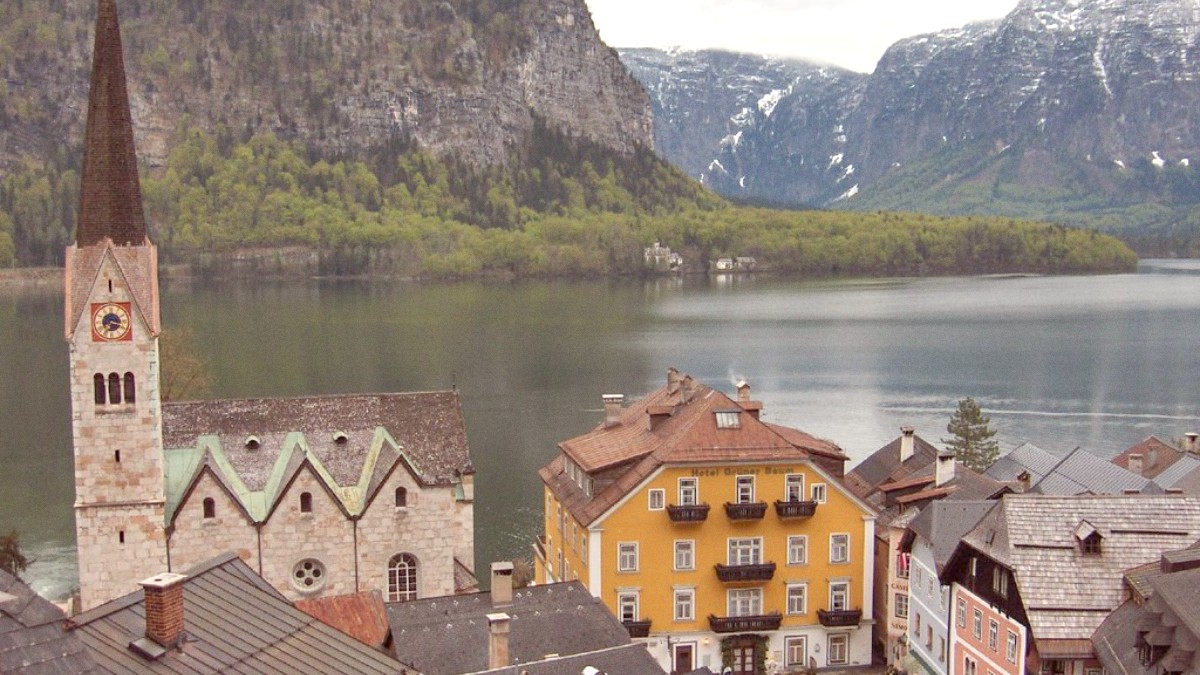
Salzkammergut, Austria
Spring (April-May): Temperatures typically range from 5°C to 15°C (41°F to 59°F). Weather varies, with sunny days mixing with rain showers. Snow can persist in higher elevations, especially in April. The landscape awakes with blossoming flowers and fresh green foliage.
Summer (June-August): These are the warmest months, with average temperatures between 15°C and 25°C (59°F to 77°F). Temperatures occasionally reach 30°C (86°F). Summer also brings the most rainfall, often as intense, short-lived thunderstorms in the afternoons.
High Season (June-August, December): Warm weather makes lake activities and hiking pleasant. All attractions operate with full hours. December features a festive, snowy ambiance with charming Christmas markets.
Expect high visitor numbers. Accommodation and tour prices peak. Anticipate longer queues for attractions and limited parking. Popular viewpoints fill quickly.
June-August, December
Warm weather, full attraction hours, festive December.
Extreme crowds, highest prices, long queues, limited parking.
April-May, September-October
Fewer crowds, moderate temperatures, beautiful scenery, lower prices.
Variable weather, some smaller attractions may have reduced hours.
January-March, November
Very few tourists, quiet atmosphere, stunning snowy landscapes, lowest prices.
Many attractions closed or limited, limited dining, cold weather, inaccessible trails.
Austria belongs to the Schengen Area, a zone of 27 European countries that no longer conduct passport and other border control at their mutual borders.
Schengen Visa (Short-Stay): Citizens of many non-EU/EEA countries require a Schengen visa for stays up to 90 days within any 180-day period. Apply for this visa at an Austrian embassy or consulate in your home country before your travel date. Visa-Exempt: Citizens from countries like the US, Canada, UK, Australia, New Zealand, Japan, and South Korea, enter Austria for tourism for up to 90 days without a visa. ETIAS (European Travel Information and Authorization System): Expected to launch in mid-2025. Visa-exempt travelers will need an ETIAS authorization before travel.
Valid for three months beyond departure, issued within 10 years.
Evidence to cover your stay.
Return flight ticket or itinerary.
Required for Schengen visa applicants.
Generally, no special permits for tourism activities.
These estimates cover accommodation, meals, basic transportation within the area, and a paid activity.
Accommodation: Hostel dorm bed in nearby Obertraun or Bad Goisern, or a basic guesthouse room outside the main Hallstatt village (€30-€50).
Accommodation: Comfortable mid-range hotel or apartment in or near the village center (€80-€150).
Estimates for various services in Hallstatt.
| Category | Item/Service | Estimated Price Range |
|---|---|---|
| Accommodation | Hostel/Guesthouse (per night) | €30-€80 |
| Meals | Lunch (casual) | €12-€25 |
| Attractions | Hallstatt Skywalk & Salt Mine (combined) | €40-€45 |
A small personal health kit protects against minor issues.
Mountain and lake environments intensify sun exposure. Use high SPF sunscreen, wear a wide-brimmed hat, and seek shade.
A risk, especially in summer or when hiking. Carry a reusable water bottle and refill often. Tap water is safe to drink.
Ticks carrying TBE can appear in forested areas, specifically in spring and summer. A vaccine for TBE exists. Wear long sleeves and pants when hiking in wooded areas.
Hallstatt's cobblestone streets and hilly paths lead to slips or twists. Wear comfortable, supportive footwear.
Include basic pain relievers, adhesive bandages, antiseptic wipes, allergy medication, antacids, anti-diarrhea medication, and blister treatment (e.g., Compeed Blister Plasters).
Carry all prescription medications in their original packaging. Include a copy of your prescription and a doctor's note, especially for controlled substances. Pack enough for your entire trip.
Bring small quantities of common over-the-counter medications for cold symptoms, headaches, or an upset stomach.
Police, Fire, Ambulance. Specific numbers: 144 for Ambulance, 133 for Police, 122 for Fire.
Marked by a green cross sign. Well-stocked and offer advice for minor ailments. Hallstatt has limited options, larger towns like Bad Ischl have more.
For non-emergencies, ask your hotel for a local general practitioner (Arzt).
Be aware of potential seasonal hazards, especially in mountainous areas.
Always be prepared with essential emergency information.
Highly recommended for all travelers. A policy covers medical emergencies, emergency evacuation, trip cancellation or interruption, and lost luggage.
Always carry the European Emergency Number: 112. Know contact for your local embassy or consulate in Austria (usually in Vienna).
Inform family or friends of your itinerary and lodging details. Store important contact numbers (hotel, travel insurance, family) in your phone and on paper.